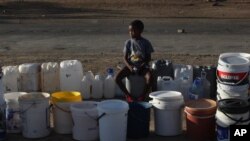Afrobarometer plans to release a report of its latest survey of citizens in 36 African countries on their access to clean drinking water and sanitation, to coincide with World Water Day on Tuesday.
Officials of Afrobarometer, a pan-African non-partisan research network, say they conducted 54,000 interviews in the poll.
According to the survey, the past decade has seen no improvement in water scarcity. It says across 18 countries tracked since 2005-2006, the average proportion of respondents who went without enough water increased marginally, from 40 percent to 43 percent. Six countries had significant reductions in the number of citizens who went without water. Cape Verde led by a 27 percent drop while Namibia had a 25 percent reduction.
Brian Howard, Afrobarometer’s publications manager, outlined some of the key findings of the survey. He says 45 percent of the respondents said they went without enough clean water at least once during the previous year, while 19 percent did so many times or always.
The study also showed that about 51 percent of Africans can only have access to water outside of their compound and that 36 percent of the surveyed communities have no infrastructure for piped water. About 68 percent of respondents lack sewerage infrastructure, while 20 percent have to leave their compound to use the latrine, and 8 percent don’t have any access to a latrine or toilet outside their compound.
“Water supply is considered a priority to the people we’ve talked to or by the survey respondents. It’s the fifth most important problem across these 36 countries that citizens say their country needs to address. And in some countries, Burkina Faso, Guinea and Niger, it’s the number one problem that the people want their governments to address. And a majority, 55 percent of citizens, say that their governments currently are performing badly in terms of ensuring access to water and sanitation. So this is an important problem that the people want their governments to address,” said Howard.
“Some of the findings were that there has been some slow progress in terms of infrastructure for water and sanitation. Both have increased slightly, but still more than one-third of the surveyed communities have no infrastructure for water and more than two-thirds have no infrastructure for sewage. And of course in rural areas it’s far worse than in cities.”
Howard also said about 55 percent of African citizens described their governments as “fairly bad” or “very bad” in handling water supply. He also said the polls focused on the alternatives the respondents have embraced to address their water and sanitation needs.
“Basically, they have to go far. We found, for example, that a majority of people, 51 percent, have to go outside, not only outside their homes but outside their compound to get water. That’s a real problem and that is true of many citizens. It varies by countries. In Sierra Leone, Uganda, Guinea, Lesotho, Burkina Faso, fewer than one in 20 people have water inside their home. So most of the people have to go outside their compound… These have real implications in terms of how easy or difficult it is to get clean water and to use facilities. And this obviously has implications for public health as well as other areas,” said Howard.
“The countries that have done well [and] that continue to do well in terms of infrastructure and access to water and sanitation are the North African countries - across the board, they tend to do better. The countries that do least well are East African countries. So there is a real gap between the North African countries and the East African countries, and then West and Southern and Central Africa are sort of in the middle.”




